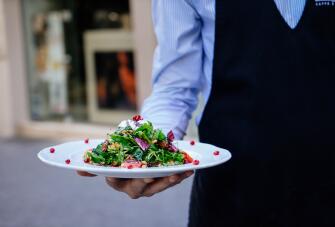How to Hire a Chef for Your Restaurant
So, you’ve decided to open a restaurant. You’ve scouted a venue, landed funding, established your vision for your brand, and done loads of market research. You’re chomping at the bit, raring to go. You’re now in the position to start hiring staff.
One of the most important positions you can hire for in your restaurant is your chef. The chef is the main creative engine behind your restaurant and can often become the face of your organization. Chefs can become so well-known in the restaurant business that they often become synonymous with the establishment.
The chef can often lead a rock-star lifestyle in response to the massive pressures they face in the kitchen. They work hard and play hard. This means that you have to choose your potential new chef carefully since they’ll be in charge of everything from nightly services and ordering food to staffing and marketing.
Keep reading to find out how to hire a chef for your restaurant.
Figure out what your restaurant needs
As the manager or owner of your restaurant, you’ll have a good idea of what your restaurant needs in a chef to be successful.
The kind of chef you hire will depend on the type of establishment, the type of food you serve, and more.
Are you a full-service restaurant or a quick-service restaurant? Do you serve food that requires specialization or training? To what extent are you able or willing to train a new chef? Do you want your chef to simply be in charge of service, or do you want them to take responsibility for things like scheduling?
Make a list of all these things you’ll need in your new hire. This will help you define the type of person you’re looking for.
For example, you may find that you’re a full-service restaurant with a small kitchen that needs a chef who will manage a team of two and who needs experience in cooking techniques like sous vide and sustainable food sourcing.
Also, keep in mind that different chefs have different skills and bring different things to the table. For example, some chefs might specialize in vegan cooking, others might specialize in cooking techniques like barbecue. Likewise, others might specialize in cooking large amounts of food for large amounts of people.
What kind of chef are you hiring?
There are lots of different kinds of chef, all with their own responsibilities and specializations. Make sure you know the kind of chef you’re hiring and what they’re likely to be able to do.
The ideal qualities of a chef
There are certain qualities that every chef needs to excel in his role:
- Attention to detail: Everything that comes out of the kitchen is the chef’s responsibility. That undercooked piece of cod or the not-fully-washed plate will reflect badly on them and the restaurant. Good chefs are meticulous in their attention to detail, not allowing small mistakes to slip by their watchful gaze.
- Grace under pressure: Running a kitchen can be one of the most stressful jobs out there. A good chef will be resilient in the face of mounting pressure and constant demands.
- Management and leadership skills: Chefs not only have to be good cooks in their own right. They have to be able to manage stock, orders, costs, and, most importantly, other people. A good chef will know how to identify good candidates for positions, provide motivation and assistance where necessary, and groom enthusiastic candidates for other positions.
- Understanding of waste reduction and profit maximization: Food costs make up a huge part of your restaurant’s budget. A good chef will be able to turn the basest, cheapest ingredients into delicious meals that customers will want to buy, while keeping waste at a minimum.
- Computer skills: Everything is done on a computer these days. From scheduling and project management software to working with spreadsheets, a good chef will have knowledge of, and be able to work in, the latest software suites.
- Shared vision: Above all, it’s important that the chef you hire shares an outlook and vision for how you want your establishment to operate and grow.
Does your current chef just need a wake-up call?
If you already have a chef for your restaurant, but they aren’t performing well, think hard before hiring someone new.
It could be that your current chef just needs some extra training, more responsibilities, or more scope to express their creativity. There may be aspects of their work they find unsatisfying or difficult to deal with. A lot of the time, poor performance can result from a host of factors that are easily fixable, so it’s important to keep the lines of communication with your chef open.
After all, hiring a new chef can be a long and expensive process. And if your head chef decides to leave once they find out you’re looking, it could cause a lot of damage to your operations and reputation if they decide to walk out.
Write a great job ad
Once you’ve identified what you’re looking for, it’s time to write an amazing job ad that’ll get even the most skeptical job seeker applying.
It’s important when writing a job ad to be as detailed and transparent as possible in what you’re offering. You’ll want to include details about:
- Salary
- Hours
- Required qualifications/training
- Desired experience
- Location
When writing your job ad, try to make the text as exciting and readable as possible. While a good salary might be enough to attract some applicants, setting out your restaurant’s brand and outlining what your organization stands for will help attract the right people.
Start looking
Once you’ve got your job posting written, you can start putting out feelers. Here are some great ways to go about finding your next hire:
Advertise on popular job boards
Your first point of call should be the most popular job boards like Indeed, Monster, and LinkedIn. These job boards have the widest reach and can help you get your ad in front of as many people as possible.
There are also an array of job boards dedicated to the hospitality and restaurant industries. These include:
Hire internally
In their search for the perfect candidate, a lot of organizations don’t pay attention to what’s right on their doorstep. It could be that you have a talented sous chef or line cook just waiting to be discovered. If you think that may be the case, open up your search to the people in your employ.
Network with other restaurants
It could be that your ideal candidate is working for one of your competitors and would jump at an opportunity to take a role, if only they knew. Connections within your industry are some of your best resources, so take advantage of them.
Check national culinary schools
Culinary schools love to give their students practical work experience. Talk to the administrators of your local school to see if there are any good candidates ready to take on your openings. Many culinary schools also keep resumes of their alumni on file. The faculty at these places are also great people to network with.
Set up interviews
Once you’ve got a bunch of candidates in mind, it’s time to start setting some interviews. Most interviews for chef positions involve an in-person interview followed by an observation and tasting.
During your in-personal interview, you should ask your candidates about their experience, knowledge, skills, and their suitability for the job. You’ll also want to have a conversation with them to make sure they understand what your organization is trying to achieve and how they can help you achieve it.
Sample interview questions
Here are some sample interview questions for your interview:
- Have you eaten at the restaurant? If so, what was your experience like? What would you change if you could?
- What ingredients do you enjoy working with?
- How have you resolved conflicts between staff in the past?
- What are your strategies for managing waste and maximizing profits?
- How would you change our menu?
- What kind of team would you need to build?
- What was your best experience of working in a kitchen? What was your worst?
- How have you helped your chefs and cooks improve their knowledge and skills?
- What’s the most interesting trend in cuisine right now? If you were to take the job, how would you react to it?
Observation and tasting
Once you’ve talked to them, it’s time for your candidates to show you their skills. After all, most chefs would rather show you what they can do than tell you about it.
Most chefs tend to interview for jobs by doing an observation and a tasting. Invite them to use your facilities to make a dish or two, and observe them to ensure they know how to use your equipment.
Of course, the proof of the pudding is in the tasting. Once they’ve created their dish, it’s time to chow down. You can usually tell if you’ve got the right person from the first bite of their dish.
Maximize your efficiency with a great point of sale system
Just as important as hiring the right people for the job is getting the right gear. You need to make sure that your kitchen and front of house work seamlessly together to squeeze every bit of profit out of your resources.
Epos Now offers amazing point of sale systems for hospitality businesses of all kinds, from hotels and cafes to bistros and bars. With an Epos Now POS, you can:
- Synchronize your front and back of house to increase sale and table turnover
- Offer online ordering options to win customers
- Access data from any device at any time
- Use in-built customer relationship management systems for promotions to drive repeat business
- Take all types of payments quickly
- Track time-at-table and manage floor plans
- Take tableside ordering and payment



